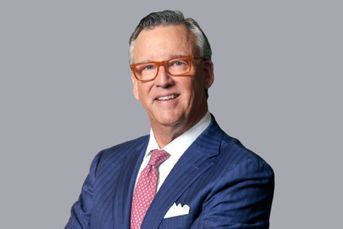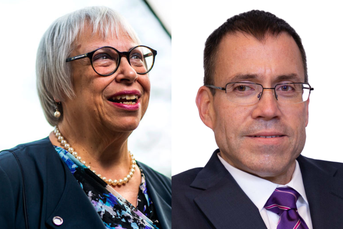Money-market debit cards for clients? Franklin CEO on the future of advice

Chief Executive Jenny Johnson outlined the $1.4 trillion manager's interest in technology and retirement assets at the Spark Forum
The future of 401(k)s includes private equity investments and annuities, and even new products like money-market debit cards, Franklin Resources CEO Jenny Johnson told attendees at the Spark Forum Wednesday.
It’s a future in which remote work will be normal — even absent a crippling pandemic — and one where blockchain and artificial intelligence will be integral in the retirement plan business, Johnson said during the event, which was held virtually.
“In my 30-plus years in this industry, we’ve never experienced change like we’re experiencing now,” said Johnson, who earlier this year took the helm of what is now a $1.4 trillion asset management firm. Remote work “is here to stay,” she added.
The norm will be a hybrid work arrangement, in which employees are unwilling to make 90-minute commutes more than one or two days a week, she said. “Companies are going to have to be more accommodating to their employees.”
Johnson assumed the top position at the firm in February, succeeding her brother Greg Johnson. This year, the company more than doubled its assets under management through Franklin Templeton’s acquisition of affiliate-based manager Legg Mason.
FUTURE OF THE 401(K)
Retirement savers and plan sponsors increasingly want customized services, Johnson said.
The next frontier in the defined-contribution world is retirement income, which can be addressed through managed accounts that include an annuity component, she said. A benefit of managed accounts is that they can also provide participants with exposure to private equity, without giving workers unrestricted access to an asset class that must be used judiciously in portfolios, Johnson noted.
Despite the Department of Labor’s recent final rule that could restrict the use of environmental, social and governance criteria in 401(k) investments, that area represents a growth opportunity, she said.
“We actually can get younger people engaged in investing,” as they are interested in having their investments contribute to a greater social good or have minimal environmental impact, Johnson said.
“There is an opportunity with customization to drive purpose in investing,” she said. “Things like blockchain are going to be important in that component.”
Active managers will increasingly need to use data, including through artificial intelligence, to consider how social sentiment, governance, employee welfare and carbon footprint affect value and potential returns, Johnson said.
“If you’re an active manager, you are going to have to leverage data insights from nontraditional sources,” she said. “All those things are massively stored in data, and analysts are going to have to build models around that.”
BUYING GROCERIES
Franklin has a lot of interest in blockchain. Last year, the company filed an initial prospectus for a blockchain-based government money-market fund that would let clients buy and redeem shares through an app. Eventually, clients could use such products like debit cards for everyday purchases, such as groceries.
“Blockchain is huge for our industry. And what we’re doing on the money market is the tip of the iceberg,” Johnson said. “It was natural for us to say, ‘Let’s take a money market and make it a stable coin.’”
That differs from other digital currency, like Bitcoin, because of a “stable coin” being regulated, she said.
Franklin is currently working with a Singapore-based virtual gaming company, Razer, which has waded into the wealth management and banking space, she noted.
That overlap of wealth management, gamification and virtual reality, has a lot of potential to get younger people interested in saving, even for retirement, Johnson said
“You have to think about it almost as a new distribution channel,” she said. “If you can get that younger generation engaged in saving earlier in a nonthreatening environment … then we are all better off, because of that compounding interest.”
Hypothetically, a person who saves $5,000 per year between the ages of 25 and 35 and then stops saving will end up with more money at retirement than someone who begins saving that much at 35 and continues until they are 65, she said.
“We need people to start saving earlier,” Johnson said. “Most people didn’t grow up loving stock markets, thinking about investing.”
Learn more about reprints and licensing for this article.








